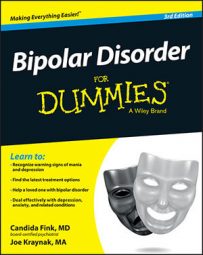The following table lists several antidepressants used in the treatment of bipolar disorder besides Selective Serotonin Reuptake Inhibitors (SSRIs) and Selective Serotonin and Norepinephrine Reuptake Inhibitors (SNRIs) that affect serotonin but differ structurally from the SSRIs and SNRIs.
Two of the medications in the table are used commonly as sleep aids because they're so sedating, and some affect other neurotransmitters as well.
| Generic Name | Brand Name | Average Adult Dose | Potential Benefits | Some Possible Side Effects* |
|---|---|---|---|---|
| Mirtazapine | Remeron | 15 to 25 mg/day | Antidepressant (approved for use in unipolar depression); very sedating (often used as a sleep aid). | Suicidal ideation; agitation; disinhibition; mania; sedation; weight gain; dry mouth; increased cholesterol. |
| Nefazodone | Serzone | 300 to 600 mg/day | Antidepressant (approved for use in unipolar depression); antianxiety. | Suicidal ideation; agitation; disinhibition; mania; liver abnormalities (liver function should be monitored); sedation; insomnia; headache; dry mouth; constipation; muscle weakness; sexual dysfunction. |
| Trazodone | Desyrel | 150 to 600 mg/day | Antidepressant (approved for use in unipolar depression); sedative (often used as a sleep aid). | Suicidal ideation; agitation; disinhibition; mania; sedation; dry mouth; headache; dizziness and nausea; sexual dysfunction; priapism (an erection that doesn't stop, which can be a medical emergency). |
| Vilazodone | Viibryd | 20 to 40 mg/day | Antidepressant (approved for use in unipolar depression). | Suicidal ideation; agitation; disinhibition; mania; belly and gastrointestinal problems; sexual dysfunction. |
| Vortioxetin | Brintellix | 5 to 20 mg/day | Antidepressant (approved for use in unipolar depression). | Suicidal ideation; agitation; mania; nausea; sexual dysfunction. |
mg/day = milligrams per day
* Other side effects may occur that aren't listed.

